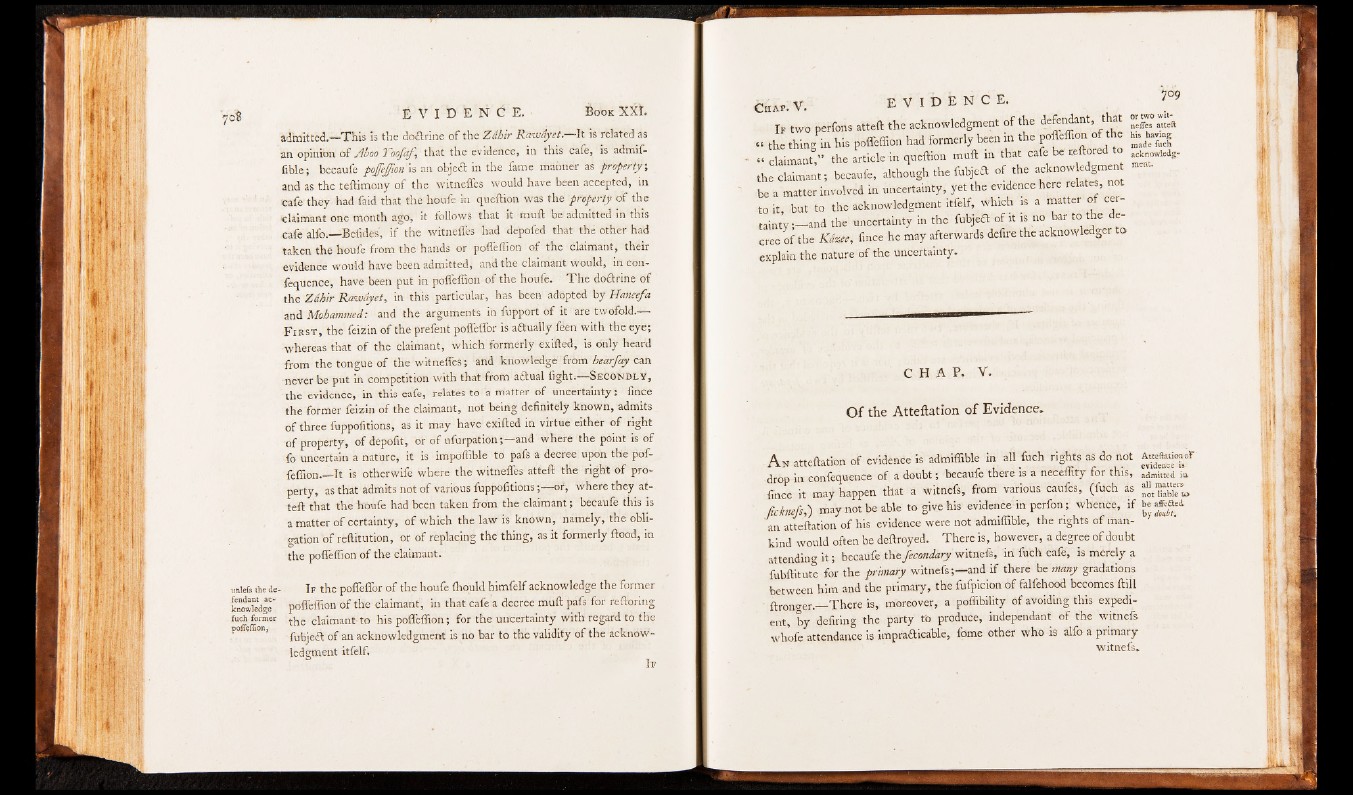
unlefs the defendant
acknowledge
fuch former
poffeffion,
É V I D E N C E . Book XXÎ.
admitted.— This is the doftrine of the Zâhir Rawâyet.— It is related âs
an opinion of jîboo 'Y'oofaJ', that the evidence, in this cafe, is admiffible;
becaufe poffeffion xs'an objed in the fame maimer as property-,
and as the teftimony of the witneffes would have been accepted, in
'cafe they had faid that the hoüfe in queftion was the property of the
Claimant One month ago, it follows that it -muft be admitted in this
cafe alfo,__Bolides’, if the witnefles had depofed that thé other had
taken the houfe from the hands or pofleflion of the claimant, their
evidence would have been admitted, and the claimant would, in con-
-fequence, have been put in poffeffion of the houfe. The doctrine of
the Zâhir Rawâyet, in this particular, has been adapted by Haneefa
and Mohammed: and the arguments in fupport of it are twofold. ■
F irst, the feizin of the prefent poffeffor is;aa:ually feèn with the eye*,
whereas that of the claimant, which formerly exifted, is only heard
from the tongue of the witneffes; and knowledge from hearfay cab
never be put in competition with that from a clued fight.- Secondly,
the evidence, in this cafe, relates to a matter of uncertainty; fince
the former feizin of the claimant, not being definitely known, admits
of three fuppofitions, as it may have- exifted in virtue either of right
of property, of dépolit, or of ufurpation ;—and where the point is of
fo uncertain a nature, it is impóftible to pafs a decree upon the poft-
feffion._It is otherwife where the witnefles atteft the right of property,
as that admits not of various fuppofitions ;— of, where they atteft
that the houfe had been taken from the claimant; becaufe this is
a matter of certainty, of which the law is known, namely, the obligation
of reftitution, or of replacing the thing, as it formerly flood, in
the poffeffion of the claimant.
I f the poffeffor of the houfe ftiould himfelf acknowledge the former
poffeffion of the claimant; in that cafe a decree muft pafs for reftoring
the claimant to his pofleflion ; for the uncertainty with regard to the
fubjeft of an acknowledgment is no bar to the validity of the acknowledgment
itfelf.
C hap. V. e v i d e n c e . 1°9
I f two perfons atteft the acknowledgment of the defendant, that j ^ s°
“ the thing in his poffeffion had formerly been in the P . , made fuch
I claimant,” the article in queftion muft in that cafe be ceftore acknowledg-
the claimant; becaufe, although the fubjed of the acknowegment m
be a matter involved in uncertainty, yet the evidence here relates, not
to it but to the acknowledgment itfelf, which ■ a matter of certainty—
and the uncertainty in the fubjeft of it is no bar to the decree
of the Kdzee, fince he may afterwards defire the acknowledger to
explain the nature of the uncertainty-
C H A P. V .
O f the Atteftation of Evidence.
A n atteftation of evidence is admiffible in all fuch rights as do not | | | g | f
drop in confequence of à doubt ; becaufe there is a necelfity for this, admitted ia
fince it may happen that a witnefs, from various caufes; (fuch '‘as
M I may not be able to give his evidence in perfon; whence, if
an atteftation of his evidence were not admiffible, the rights of mankind
would often be deftroyed. There is, however, a degree of doubt
attending it; becaufe the fecondarymttiefs, in fuch cafe, is merely a
fubftitute for the primary witnefs;— and if there be many gradations
between him and the primary, the fufpicion of falfehood becomes ftill
ftronger.— There is, moreover, a poffibility of avoiding this expedient,
by defiring the party tb produce, independant of the witnefs
whofe attendance is imprafticable, feme other who is alfo a primary
witnefs.